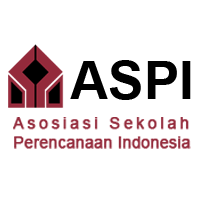PERCEPATAN PENERAPAN TEKNOLOGI PEMBUANGAN LIMBAH DOMESTIK ONSITE SISTEM KOMUNAL BERBASIS PARTISIPASI MASYARAKAT
DOI:
https://doi.org/10.29313/jpwk.v10i2.243Keywords:
acceleration, waste, onsite, communal, participatoryAbstract
Increasing population and development activities will have an impact on the quality of the environment due to the increased volume of domestic waste generated. It is a challenge to the government how waste is managed so that development is also accompanied by an increase in environmental quality improvement. In practice this will be difficult work if fully charged to the government alone. Needed a helping hand to help the public to participate in the government's handling of domestic waste issues. Domestic wastewater disposal technology in local (onsite system) is one way of disposal of waste water that can be directly built community. However, in certain circumstances the onsite construction of this system was very expensive. However, the technology is very easy to apply, can be done onsite system collectively (communal). Its interesting to research is where groups of people who have the desire to build these facilities independently.
Analysis of specific technical requirements, the first step to sorting areas suitable for the application of technology onsite wastewater system. After that, the analysis of other technical criteria derived characteristic that the development can be carried out onsite systems in communal. An analysis of preparedness and ability to pay will give clues about the groups of people who are ready to participate in building infrastructure ALR waste independently.
Technical data processing in the city of Pekanbaru Riau showed 32 districts that have a match for the application of wastewater disposal systems locally. 13 of them have the potential to be physically constructed communally. While the processing of data from interviews with 12 people showed groups of people in the city of Pekanbaru is willing and able to build their own onsite communal system.
References
Agatha, P. 1999. Ilmu Ekonomi Lingkungan. Balai Pustaka. Jakarta
Agus Sugiyono. 2001. Analisis Manfaat dan Biaya Sosial. Fakultas Ekonomi UGM. Yogyakarta
Altaf, Dale Whittington. 1992. Willingness to Pay for Water ini Rural Urban Punjab Pakistan. The World Bank. Washington, D.C.
Ari Nurman. 2000. Implikasi Kemampuan dan Kesediaan Membayar Tarif Retribusi Air Kotor Terhadap Penyediaan Pelayanan Prasarana Air Kotor.Tugas Akhir. Fakultas Planologi, ITB.
Asisten MAP. 2003. Modul Praktikum Metode Analisis Perencanaan. Jurusan Teknik Planologi. UNISBA. Bandung
Fauzi, Ahmad, 2000, Ekonomi Sumber Daya Alam dan Lingkungan, Balai Pustaka, Jakarta
Hani Burhanudin Ir, MT. 2004. Modul Mata Kuliah Prasarana Wilayah Desa dan Kota. PS.PWK-UNISBA. Bandung.
Hendra. 2007. Komunikasi Pribadi. UNISBA. Jurusan Statistik. Bandung, Indonesia
Republik Indonesia. 2001. Peraturan Pemerintah No. 82 Tahun 2001 tentang Pengelolaan Kualitas Air dan Pengendalian Pencemaran Air. Kementrian Lingkungan Hidup. Jakarta
ITB, LAPI. 2002. Penyusunan Feasibility Study Pembangunan Infrastruktur Kota Pekanbaru. ITB. Bandung.
Rencana Umum Tata Ruang Kota Pekanbaru (RUTRK) Tahun 2002 – 2006
Sudjana. 2002. Metode Statistika. Tarsito. Bandung
Tigin. 2007. Komunikasi Pribadi. POLBAN. Jurusan Teknik Sipil. Bandung, Indonesia
Pekanbaru Dalam Angka Tahun 2004
Winda Febrianti. 2007. Identifikasi Lokasi Pembuangan Limbah Domestik Menggunakan Onsite System komunal Ditinjau Dari Sosial Ekonomi Masyarakat di Kota Pekanbaru PropinsiRiau. Tugas Akhir. Program Studi Perencanaan Wilayah dan Kota Universitas Islam Bandung.
Yandiantono. 2000. Kamus Umum Bahasa Indonesia. Balai Pustaka.Jakarta















